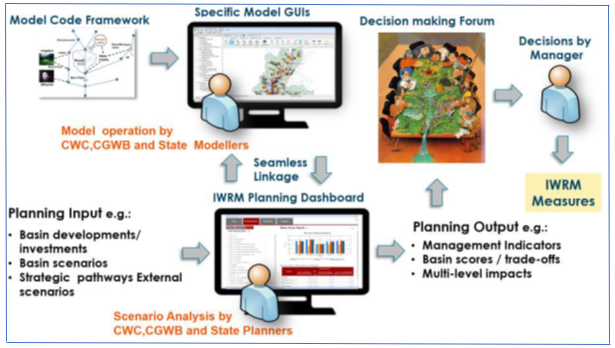A Decision Support System (DSS) is an interactive system, usually software-based, developed to support the stakeholders in the decision-making process by accessing and analyzing available data and information. The DSS can help in identifying problem areas as well as relevant solutions for efficient management including support in policy formulation.
A DSS in water resources management is a software framework designed to help decision makers and implementing agencies to develop sustainable protocols for water management surrounding issues of governance, sustainability and equitable water distribution.
A. Decision Support System (DSS) for springshed management in Himalayan States
Based on the learning from springshed initiative under SCA-Himalayas project, a standardized open access online decision support system (DSS) for springshed management is developed. The framework for the DSS is developed in consultation with partners and relevant stakeholders and built on the six steps protocol which includes the following:- Comprehensive mapping of springs and springsheds
- Setting up a data monitoring system
- Understanding social and governance systems
- Hydrological mapping, development of conceptual layout and identification of recharge area
- Development and implementation of springshed management and governance protocols
- Measuring the impacts of spring revival activities
Based on the experience in the pilots for springshed management, the six-step protocol will be updated and contextualised. The updated protocols will be incorporated in the DSS.
The DSS is simple, easy to use, and co-developed with decision makers to ensure wider interest and ownership. The DSS will enable decision makers and project implementation agencies to develop protocols for springshed management and governance, and guidelines for equitable water access and distribution, and sustainability of springs.
B. Water resources management in reservoirs in Madhya Pradesh
SCA-Himalayas has supported optimization of reservoir operations in Madhya Pradesh. A declining trend in water resource availability mandates a judicious allocation of water for various uses. This necessitates improved water management in the reservoirs by enhancing the decision-making capabilities of the relevant stakeholders from the perspective of, amongst other, climate change.
A Climate Change-Decision Support System (CC-DSS) for reservoirs enables the relevant department(s) and other stakeholders to assess the water availability in advance by running simulations of various scenarios and corresponding adaptation measures. For any CC-DSS to be widely applicable, it is important that it simulate the operations of a multipurpose dam which combines storage as well as supply of water for irrigation, industry and drinking, along with other uses including flood control, power generation, and navigation.
A CC-DSS was developed for the Water Resources Management Department, Govt of Madhya Pradesh to cater to multi-purpose dam operations. This CC-DSS is based on the various model interactions between both climatic and hydrological parameters. The mathematical modelling framework consists of a set of models, which have been established to simulate historical and future conditions for the catchment and be able to address the relevant planning and management issues. The outputs generated by the modelling framework are further processed in the CC-DSS to produce useful assessment and planning information. The CC-DSS was tested using data of the Rani Avantibai Sagar (Bargi) Dam.
Water balance modelling was carried out to estimate supply and demand of water in the catchment where supply is derived from the reservoir and from canals, and the demand is for irrigation, domestic use water, hydropower generation, as well as for commercial use. Modelling was also carried out to assess the impact of surface and ground water management for various water availability scenarios. The results from the models were used in the DSS to assess various scenarios.
A unique feature of this DSS is the availability of an online modelling template which can be used for developing single reservoir models on the web. It has the capability to create hydrological models for basin planning by adding required model objects (reservoirs, water supply users, irrigation users, hydropower plant) online and simulate the model to estimate the sectoral water demands.
The DSS users have the option to modify and enhance existing water uses (e.g. drinking, irrigation etc.), change catchment area, the land use, cropping pattern and area, irrigation schemes, amongst others, to develop various scenarios. The performance of each scenario is quantified through the use of indicators. The DSS calculates the indicators based on the model inputs, quantifies, and then ranks the performance of the scenarios.
The CC-DSS also includes a provision for multi-criteria analysis so as to take an informed decision on selecting adaptation measures, also integrating a cost-benefit analysis to justify computed investment and to also identify appropriate cost reduction strategies.

Various steps for basin planning using CC-DSS
The link to access CC-DSS is: http://3.111.51.191/CCDSS
C. Decision Support System (DSS) to support Integrated Water Resources Management (IWRM) planning in Uttarakhand
The DSS will support development of an IWRM plan for a sub-basin in Bhagirathi River Basin in Uttarakhand that can be up-scaled across other Himalayan basins. The DSS will be able to perform analysis and comparison of parameters derived from various data sources like hydrology, cryology, meteorology, and data from demographic and socio-economic surveys. The DSS will support the analysis of different management alternatives and climate change adaptation options and contribute to IWRM planning.

